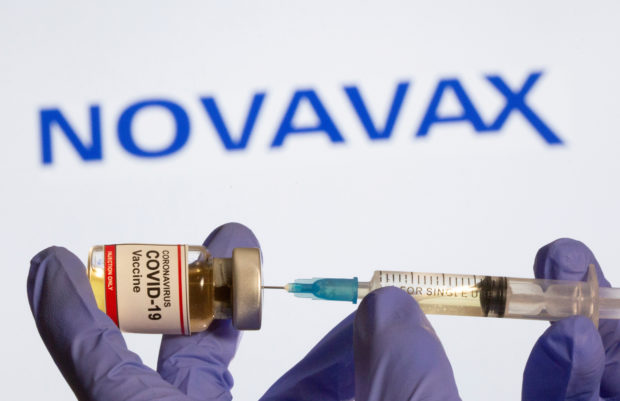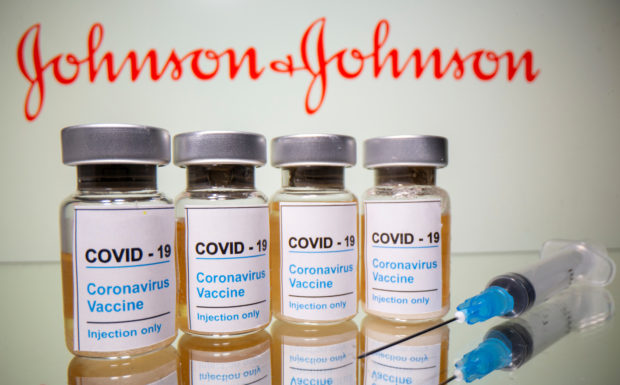Fresh data show toll South African virus variant takes on vaccine efficacy

A woman holds a small bottle labeled with a “Coronavirus COVID-19 Vaccine” sticker and a medical syringe in front of displayed Novavax logo in this illustration taken, October 30, 2020. (REUTERS/Dado Ruvic/File Photo)
CHICAGO – Clinical trial data on two COVID-19 vaccines show that a coronavirus variant first identified in South Africa is lessening their ability to protect against the illness, underscoring the need to vaccinate vast numbers of people as quickly as possible, scientists said.
The vaccines from Novavax Inc and Johnson & Johnson were welcomed as important future weapons in curbing deaths and hospitalizations in a pandemic that has infected more than 101 million people and claimed over 2 million lives worldwide.
But they were significantly less effective at preventing COVID-19 in trial participants in South Africa, where the potent new variant is widespread, compared with countries in which this mutation is still rare, according to preliminary data released by the companies.
“Clearly, the mutants have a diminishing effect on the efficacy of the vaccines,” Dr. Anthony Fauci, director of the National Institute of Allergy and Infectious Disease, said in a briefing. “We can see that we are going to be challenged.”
Novavax reported midstage trial results on Thursday that showed its vaccine was 50% effective overall at preventing COVID-19 among people in South Africa.
Article continues after this advertisementThat compared with late-stage results from the United Kingdom, in which the vaccine was up to 89.3% effective at preventing COVID-19.
Article continues after this advertisementOn Friday, J&J said a single shot of its coronavirus vaccine was 66% effective overall in a massive trial across three continents.
But there were wide differences by region. In the United States, where the South African variant was first reported this week, efficacy reached 72%, compared with just 57% in South Africa, where the new variant, known as B 1.351, made up 95% of the COVID-19 cases reported in the trial.
Another highly transmissible variant first discovered in the UK and now in more than half of U.S. states has been less able to evade vaccine efficacy than its South African counterpart.
The new findings, however, raise questions about how highly-effective vaccines from Pfizer Inc with partner BioNTech, and Moderna Inc will fare against new variants. The two vaccines showed an efficacy of around 95% in trials conducted primarily in the United States before the new virus versions were identified in other countries.
“It’s a different pandemic now,” said Dr. Dan Barouch, a researcher at Harvard University Medical School’s Beth Israel Deaconess Medical Center in Boston who helped develop the J&J vaccine.
Barouch said there are now a wide variety of new variants circulating, including in Brazil, South Africa and even the United States, that are substantially resistant to vaccine-induced antibodies.
Pfizer Chief Executive Albert Bourla said there was “a high possibility” that emerging variants may eventually render the company’s vaccine ineffective.
“This is not the case yet … but I think it’s a very high likelihood that one day that will happen,” Bourla said at the World Economic Forum. The drugmaker is considering whether its vaccine needs to be altered to defend against the South African variant.
‘STOP HOSPITALS FROM GOING INTO CRISIS’
Experts said that all four vaccines still have great value in their ability to reduce severe COVID-19.
“The end game is to stop death, to stop hospitals from going into crisis – and all of these vaccines, even including against the South African variant, seem to do that substantially,” said Dr. Amesh Adalja, in infectious disease expert at the Johns Hopkins Center for Health Security
For example, J&J’s vaccine was 89% effective at preventing severe disease in South Africa.

Vials with a sticker reading, “COVID-19 / Coronavirus vaccine / Injection only” and a medical syringe are seen in front of a displayed Johnson & Johnson logo in this illustration taken October 31, 2020. (REUTERS/Dado Ruvic/Illustration/File Photo)
J&J Chief Scientific Officer Dr. Paul Stoffels said he suspects a type of immune system reaction called a T-cell response is playing a protective role and may be helping to prevent severe disease.
“We knew that to a certain extent, but it’s also better and very confirming that we can see that now in the clinic,” Stoffels said in an interview.
Nevertheless, Fauci said the decreased efficacy rates underscore the need to follow variants closely, and to accelerate vaccination efforts before new, and even more dangerous, mutations arise.
“The best way to prevent further evolution of a virus is to prevent it from replicating,” Fauci said, “and you do that by vaccinating people as quickly as you possibly can.”
gsg
For more news about the novel coronavirus click here.
What you need to know about Coronavirus.
For more information on COVID-19, call the DOH Hotline: (02) 86517800 local 1149/1150.
The Inquirer Foundation supports our healthcare frontliners and is still accepting cash donations to be deposited at Banco de Oro (BDO) current account #007960018860 or donate through PayMaya using this link.